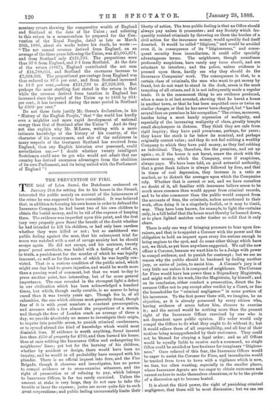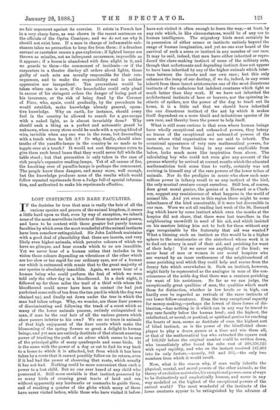THE PREVENTION OF FIRE.
THE trial of L6on Sem& the Dutchman sentenced on January 21st for setting fire to his house in the Strand, interested the public mainly on account of the heinousness of the crime he was supposed to have committed. It was believed that, in addition to burning his own house in order to defraud the Insurance Company, he had burnt two of his own children to obtain the burial money, and to be rid of the expense of keeping them. The evidence was imperfect upon this point, and the first Jury very properly gave Sere the benefit of the doubt whether 'he had intended to kill his children, or had only been careless whether they were killed or not ; but so embittered was public feeling against the man, that his subsequent trial for arson was watched with a sort of savage anxiety lest he should escape again. He did not escape, and his sentence, twenty years' penal servitude, was hailed with a feeling of relief, as, in truth, a punishment for the murder of which he was legally innocent, as well as for the arson of which he was legally con- victed. That is a curious condition of the public mind, which might one day lead to grave injustice, and would be worth more -than a passing word of comment, but that we want to-day to press another point, less interesting, but of far more general 'importance. The case revealed in the strongest light a defect in our civilisation which has been acknowledged a hundred times, but which, though easily curable, is no nearer to being cured than it was twenty years ago. Though fire is, of all calamities, the one which citizens most generally dread, though fear of it is with great numbers a constant preoccupation, and assumes with a few almost the proportions of a mania, and though the fires of London reach an average of three a day, we provide absolutely no means to investigate their origin, to inquire into possible arson, to punish criminal carelessness, or to spread abroad the kind of knowledge which would most diminish fires. If evidence is worth anything, Sern4 insured less than 2150 of property for £700, and then burned his house, thus at once robbing the Insurance Office and endangering his neighbours' lives ; yet but for the burning of his children, whether by accident or design, there would have been no inquiry, and he would in all probability have escaped with his plunder. There is no official inquest into fires, and the Fire Brigade, though it observes and investigates, has no power to compel evidence or to cross-examine witnesses, and the right of prosecution or of refusing to pay, which belongs -to Insurance Offices, is far too rarely exercised. Unless the amount at stake is very large, they do not care to take the trouble or incur the expense; juries are never quite fair to such great corporations ; and public feeling unreasonably limits their liberty of action. The true public feeling is that an Office should always pay unless it prosecutes ; and any Society which fre- quently resisted criminals by throwing on them the burden of a civil action for the insurance money, would speedily find itself deserted. It would be called "litigious," and would be avoided even if, in consequence of its "litigiousness," and conse- quent security from incendiarism, it could offer specially advantageous terms. The neighbours, though sometimes profoundly suspicions, have rarely any locus standi, and are reluctant to interfere; and the police, unless evidence is pressed upon them, hardly see why they should do the Insurance Companies' work. The consequence is that, to a certain class of criminals, the men who want to get money by fraud, but do not want to stand in the dock, arson is the most tempting of all crimes, and it is not infrequently made a regular trade. It is the commonest thing to see evidence produced, when a man is at last arrested, showing that he burnt a house in another town, or that he has been acquitted once or twice on similar charges, or that he has never been charged, but "has had several fires on premises in his occupation." The crime, moreover, besides being a most handy expression of malignity, and especially of the increasing malignity of class, greatly tempts small shopkeepers in distress. They think they are safe from rigid inquiry; they have paid premiums, perhaps, for years ; they know the stock is far below its nominal, and perhaps originally correct value ; and they do not feel robbing a wealthy Company to which they have paid money, as they feel robbing an individual. They, therefore, fire the premises, and set up again ; or, if the house is not burnt, renew the stock with the insurance money, which the Company, even if suspicious, always pays. We have been told, on good actuarial authority, that a great Bank failure is always followed by fires, and that in times of real depression, they increase in a ratio so marked, as to disturb the averages upon which the Companies rely. Whether that is correct or not, and we have ourselves no doubt of it, all familiar with insurance believe arson to be much more common than would appear from criminal records, and to be also commoner than the public would suspect from the accounts of fires, the criminals, unless accustomed to their work, oft= doing it in a singularly foolish, or it may be timid, way. They have been known, for example, to light the curtains only, in a full belief that the house must thereby be burned down, or to place lighted matches under timber so solid that it only chars.
There is only one way of bringing pressure to bear upon fire- raisers, and that is to appoint a Coroner with the power and the obligation to hold an inquest upon every fire serious enough to bring engines to the spot, and do some other things which have not, we think, as yet been anywhere suggested. We call the new officer a Coroner, because we want him to be a Judge with power to compel evidence, and to punish for contempt ; but we see no reason why the public should be hardened by finding another jury, or series of juries, to assist him. A Coroner's jury is of very little use unless it is composed of neighbours. The Coroner for Fires would have less power than a Stipendiary Magistrate, and might well do his work, like the Magistrate, by himself; and on its conclusion, either conduct a prosecution, direct the In- surance Office not to pay except after verdict by a Court, or fine the householder for "criminal negligence" in some portion of his insurance. To the first power there will, we imagine, be no objection, as it is already possessed by every citizen who, having evidence of arson before him, chooses to exercise it ; and the second would be nothing more than the present right of the Insurance Offices exercised by one who is not dependent upon public opinion. His order would only compel the Offices to do what they ought to do without it ; but it would relieve them of all responsibility, and all fear of their motives being misapprehended by their customers. They could not be blamed for obeying a legal order; and as all Offices would be equally liable to receive such a command, no single Office could be avoided or lose business for imaginary "litigious. ness." Once relieved of this fear, the Insurance Offices would be eager to assist the Coroner for Fires, and incendiaries would be tracked from town to town with a vigilance which is now, we fear, too often wanting, especially in the smaller places, where Insurance Agents are too eager to obtain customers and cannot endure to make themselves obnoxious, or to be the pivots of a discussion apt to become heated.
It is about the third power, the right of punishing criminal negligence, that there will be most discussion ; but we can see
no fair argument against its exercise. It exists in French law in a very sharp form, as was shown in the recent sentences on the officials of the Opera Comique; and we do not see why it should not exist here. If a man in charge of inflammable sub- stances takes no precaution to keep fire from them ; if a drunken servant or caretaker causes a gas-explosion ; if lighted lamps are thrown as missiles, not an infrequent occurrence, impossible as it appears ; if a house is abandoned with fires alight in it, and no guards to them—the commonest of incidents—or if the carpenters in a theatre disobey all orders about lights, those guilty of such acts are morally responsible for their con- sequences, and to make the responsibility real is neither oppressive nor inexpedient. Ten precautions would be taken where one is now, if the householder could only plead in excuse of his stringent orders the danger of losing part of his insurance, or the risk of being fined by the Coroner of Fires, who, again, could gradually, by the precedents he would establish, make knowledge already general, opera- tive knowledge. Why on earth, for instance, should every fool in the country be allowed to search for a gas-escape with a naked light, as is almost invariably done P Why should such a thing as a perfect and automatic guard be unknown, when every stove could be made with a spring-blind of wire, invisible when any one was in the room, but descending with a touch when he left it ? Or why, finally, should nine- tenths of the paraffin-lamps in the country be so made as to topple over at a touch P It would not cost threepence extra to give them such broad bases that they would never fall while the table stood ; but that precaution is only taken in the case of rich people's expensive reading-lamps. Yet of all causes of fire, the knocking over of paraffin-lamps is perhaps the commonest. The people know these dangers, and many more, well enough, but the knowledge produces none of the results which would follow repeated reprimands from a Judge full of special informa- tion, and authorised to make his reprimands effective.



















































 Previous page
Previous page